Prešeren Monument (Ljubljana)
The Prešeren Monument in Ljubljana (Slovene: Prešernov spomenik), also Prešeren Statue in Ljubljana, is a late Historicist bronze statue of the Slovene national poet France Prešeren in Ljubljana, the capital of Slovenia.[1] It stands in the eastern side of Prešeren Square, in front of the Central Pharmacy Building in Ljubljana, the capital of Slovenia. It is among the best-known Slovenian monuments.[2]
| Prešeren Monument | |
|---|---|
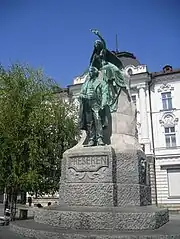 | |
| Artist | Statue: Ivan Zajec Pedestal: concept by Ivan Zajec, design by Max Fabiani, stonemason Alojzij Vodnik |
| Type | Sculpture |
| Location | Ljubljana |
| 46°3′5.07″N 14°30′22.71″E | |
Statue
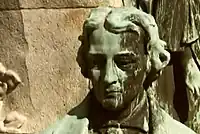
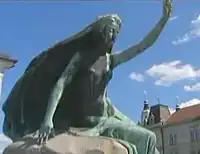
The statue that stands on a pedestal includes a sculpture of the poet, facing the window where his adored Julija Primic used to live, and a sculpture of a Muse above him sitting on a rock and holding a laurel branch in her hand.[3] The poet is dressed in the outfit of the period and holds a book symbolising his Poems (Poezije).[4][5] The sculpture of Prešeren is 3.5 metres (11 ft) high, and the entire monument is 9.6 metres (31 ft) high.[3] There is a small statue on the building that Prešeren faces, as well.[6]
Pedestal
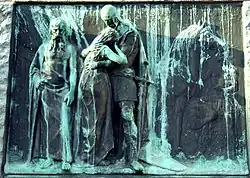
The pedestal of Prešeren's statue is made of Pohorje tonalite and has three steps.[4][5] Above it, there is a cut rock block with the inscription "Prešeren".[2][4] The lighter base of the muse is made of Tyrolian granite.[5] It was made by the stonemason Alojzij Vodnik per a design by Max Fabiani, who based his work on a concept by Ivan Zajec. A letter about the erection of the monument and some coins have been built into the pedestal.[6]
There are two bronze reliefs on the lower part of the pedestal, depicting scenes from Prešeren's Poems.[3] The right one, titled Farewell (Slovo) or Črtomir and Bogomila (Črtomir in Bogomila), depicts a scene from the poem The Baptism on the Savica. The left one, titled Fisherman (Ribič), depicts a scene from the poem Fisherman.[7] The reliefs on the pedestal were created by Zajec in 1901.[8][3] They have a Classicist composition, a Realist cadre, an impressionist final touch, and emphasise Prešeren's Romantic poetry with its content.[2] The upper part of the pedestal is decorated with a stylised lime tree, reminding of the poet's homeland's symbol.[1]
History
Creation and unveiling
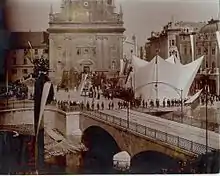
The idea for the Prešeren monument was first proposed by a group of grammar school students in 1889. In 1891, it was supported by 52 Slovene scholars, and finally, in 1898, by Ljubljana mayor Ivan Hribar. He also organised a board for this purpose.[6] Hribar announced a competition in 1899.[9] Seven sculptors submitted their proposals in time,[3][9] among them Franc Berneker, Anton Bitežnik, Jakob Žnider, Alojzij Progar, and finally Ivan Zajec, who won it.[9] He received the commission on 18 October 1900.[9]
Zajec started his work in the studio of Hans Makart in Vienna.[2] The model for Prešeren was Prešeren's portrait by Goldenstein, and he depicted the suit of Prešeren after a model from 1830–1840, borrowed in a Vienna museum. The model for the muse was Olimpia Pozatti, a dancer from Trieste. The monument of Prešeren was cast in Krupp foundry in Vienna (Kaiserlich Königliche Kunst-Erzgießerei)[9] in September 1903, and the muse was cast in the beginning of 1904.[6] The costs for the entire monument were around 71,000 kronen, largely raised by Slovene women and various societies.[9]
The monument was ceremonially unveiled on 10 September 1905. Over 20,000 people were present. The ceremonial speech was read by Ivan Tavčar.[3] A biography of Prešeren with some of his poems was published by Engelbert Gangl on the occasion.[9]
References
- Žitko, Durjava (1992). "Spomeniki 19. stoletja na Slovenskem" [Monuments of the 19th Century in the Slovene Lands]. Kronika: časopis za slovensko krajevno zgodovino [The Chronicle: the Newspaper for the Slovenian History of Places]. Association of Slovenian Historical Societies, Section for the History of Places. 40 (1). ISSN 0023-4923.
- Beja, Boris (5 November 2011). "Prešernov spomenik" [Prešeren Monument]. Planet Siol.net. Archived from the original on 7 November 2011.
- Šavc, Urška. "France Prešeren – slikovno gradivo" [France Prešeren – Pictorial Material]. In Šmid Hribar, Mateja; Golež, Gregor; Podjed, Dan; Kladnik, Drago; Erhartič, Bojan; Pavlin, Primož; Ines, Jerele (eds.). Enciklopedija naravne in kulturne dediščine na Slovenskem [Encyclopedia of Natural and Cultural Heritage in Slovenia] (in Slovenian). Retrieved 20 May 2012.
- Rozman, Ksenja (1965). "Ljubljanski javni spomeniki" [Public Monuments in Ljubljana]. Kronika: časopis za slovensko krajevno zgodovino [The Chronicle: the Newspaper for the Slovenian History of Places] (in Slovenian). Association of Slovenian Historical Societies, Section for the History of Places. 13 (2). ISSN 0023-4923.
- Stopar, Ivan; Prelovšek, Damjan (1992). Walks in old Ljubljana: a guide to its culture and history. Marketing 013 ZTP. p. 97; 132.
- "Odprti kop: Prešernov spomenik v Ljubljani" [Open Dug: Prešeren Monument in Ljubljana]. MMC RTV Slovenija (in Slovenian). RTV Slovenija. 8 February 2009.
- Znidarčič, Asta (2009). "Zajec Ivan". In Vide Ogrin, Petra (ed.). Slovenski biografski leksikon (in Slovenian). ISBN 978-961-268-001-5.
- "Nestor slovenskega sladkovodnega ribištva, slikar, konservator, potopisec, naravovarstvenik in slovenski domoljub" [The Nestor of Slovenian Freshwater Fishing, Painter, Conservator, Travel Writer, Nature Conservationist and Slovenian Patriot]. Ribič (in Slovenian) (4): 87. 2021. ISSN 0350-4573.
- "Listek: Iz zgodovine Prešernovega spomenika" [A Ticket: From the History of the Prešeren Monument]. Slovan: mesečnik za književnost, umetnost in prosveto [Slovan: A Monthly for Literature, Arts and Education] (in Slovenian). Vol. 3, no. 10. Zvezna tiskarna. 1905. pp. 318–319. ISSN 1408-0222.